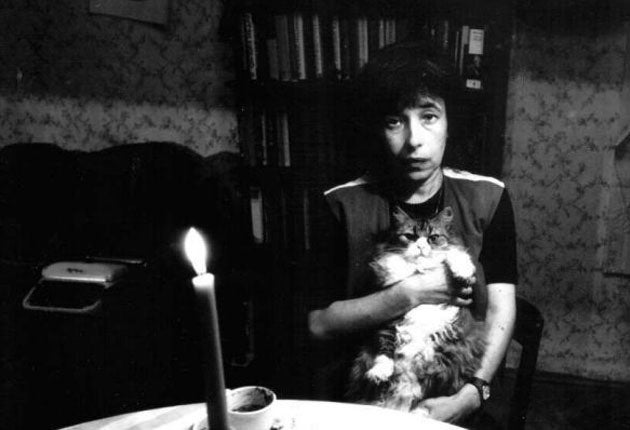Elena Shvarts: Poet whose work explored themes of marginality, poverty and authenticity

Your support helps us to tell the story
From reproductive rights to climate change to Big Tech, The Independent is on the ground when the story is developing. Whether it's investigating the financials of Elon Musk's pro-Trump PAC or producing our latest documentary, 'The A Word', which shines a light on the American women fighting for reproductive rights, we know how important it is to parse out the facts from the messaging.
At such a critical moment in US history, we need reporters on the ground. Your donation allows us to keep sending journalists to speak to both sides of the story.
The Independent is trusted by Americans across the entire political spectrum. And unlike many other quality news outlets, we choose not to lock Americans out of our reporting and analysis with paywalls. We believe quality journalism should be available to everyone, paid for by those who can afford it.
Your support makes all the difference.Elena Shvarts is acknowledged by many as one of the most important and interesting poets of her generation. Many fellow poets, including Bella Akhmadulina and Olga Sedakova, dedicated poems to her. Shvarts continued the tradition of Khlebnikov, Kuzmin, Tsvetaeva and Zabolotsky, although none of them could be called her teacher: her imagination and style were entirely individual. The loss of Shvarts for Russian poetry is comparable only to the death of Joseph Brodsky in 1996.
Elena Shvarts was born in Leningrad, in 1948 and began writing poetry at the age of 13 during Khrushchev's Thaw, but was not published in the Soviet Union till she was 40, although during the 1970s and '80s her poems were circulated widely in samizdat form and her poetry readings were popular during Brezhnev's Stagnation Era. Once she was given a chance to publish her poems in a Soviet magazine, the editor asked her to change one word dusha [soul]; she refused and had to wait many years for the next opportunity to publish. But since Corners of the Earth (1989) sold out on the day of publication, there have been 15 more books. In the West her collections have been published in America, France, Germany, and in England (by Bloodaxe, 1993, 2008).
The title of her bilingual collection Birdsong on the Seabed (2008) in Sasha Dugdale's translation, contains a metaphor for the poet – the poet as bird: "But I am different, I am a bird, I am in ferment / And until the last crystals of my song-singing / Have dissolved in the murk / I will sing." Shvarts's poetic universe includes people dead and alive, animals, especially cats and mice, Nature, stars, heaven, angels and God, all four elements, light and dark, widely alluding to Greek and Russian mythologies. There was an intense exploration of the self by the use of personae: she tried to step out of herself to observe herself. Some readers find her world eccentric and strange, others simple and naïve but always unpredictable. Shvarts extended our imagination, entertained us with her tunefulness and unexpected images, and most important, like Pushkin, believed in the ability of the poetic word, given to poets by God Himself via Nature.
Shvarts described herself as having "Judaic–Slavonic–Tatar–Gypsy" blood. She was an adherent of the Baroque wing of the Christian tradition, using a complex symbolism all her own. The pace of her mystical poems is absorbing and breaks with our habits of thought and ways of looking at things. She was born in St Petersburg, a city beset by history, its architecture reflected in her poetry. As her translator Michael Molner put it, "her Petersburg is a cross between artifice and landscape, a stone city". Shvarts explored themes of marginality, poverty and commitment to authenticity: "The dead of St Petersburg / Cleave to the living like thin snow,/ Like tight fish to the spawning run / They swim the back streets' upper flow..."
Unlike many contemporary Russian poets, Elena Shvarts did not use slang or obscenity. She hardly ever reflected political topics, except sarcastically: "I am afraid that our Soviet Moon / would want to part with us, becoming keen on others, / then our dim country will shrink even further".
Elena Andreyevna Shvarts, poet: born Leningrad 17 May 1948; died 11 March 2010.
Join our commenting forum
Join thought-provoking conversations, follow other Independent readers and see their replies
Comments